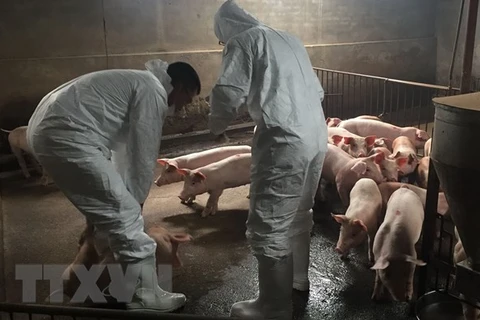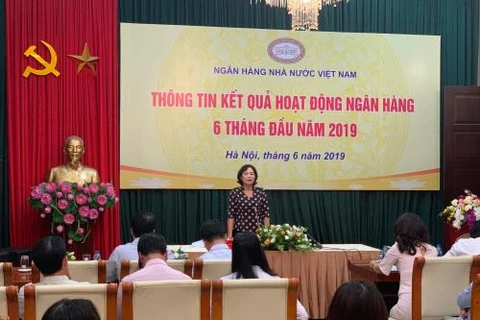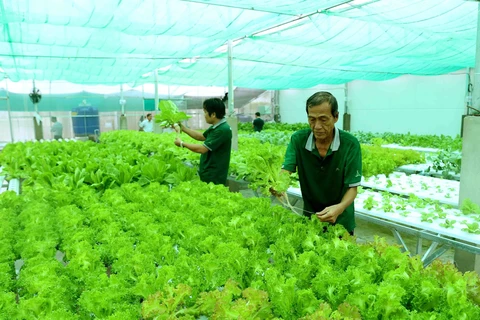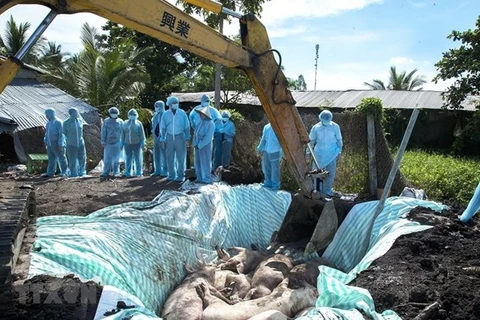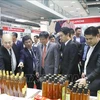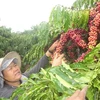 A report from the US Department of Agriculture (USDA) recently stated that African swine fever (ASF) will cause demand for animal feed in Vietnam to decrease from 23.8 million tonnes in 2018 to 23.7 million tonnes in 2019 and 23.5 million tonnes in 2020. (Source: internet)
A report from the US Department of Agriculture (USDA) recently stated that African swine fever (ASF) will cause demand for animal feed in Vietnam to decrease from 23.8 million tonnes in 2018 to 23.7 million tonnes in 2019 and 23.5 million tonnes in 2020. (Source: internet) Hanoi (VNS/VNA) - African swine fever has not only caused livestock farming households to fall into debt, but has also made it difficult for animal feed dealers to collect their payments.
If the epidemic continues, the domino effect could bankrupt the livestock industry.
Since the spread of African swine fever in Vietnam, a number of shops selling animal feed have been put in a bind because they have to sell animal feed to farmers on credit, while paying the manufacturers on receipt of the grains.
Pham Van Luong, a feed salesman in Nam Dinh’s Hai Hau district, said previously, his family sold an average of 20 tonnes of rice bran per month. However, since the outbreak of African swine fever, over the past three months they have managed to sell just 5-6 tonnes of animal feed per month.
“I sell rice bran to farmers and they often pay later. However, for some months now, pigs have been infected and culled, so farmers do not have money to pay me. Currently, I am owed nearly 2 billion VND (85,836 USD),” Luong told vneconomy.vn.
An animal feed manufacturer in the northern province of Hai Duong, PP Sun Vietnam Joint Stock Company, revealed sales had declined from an average of 2,000 tonnes per month to some 1,200-1,400 tonnes. Although the company has lowered the selling price by 5,000-10,000 VND per bag to stimulate demand, the situation has not improved. Therefore, the company has had to cut production, said the firm’s director Dao Van Bac.
According to Tran Trong Quang, Deputy General Director of Vinafeed Group, over the past three months, the company's feed consumption has decreased by about 30 percent compared to January, from 16,000 tonnes month to 11,000 tonnes. Vinafeed's product prices have decreased by 7-8 percent compared to January 2019.
Quang worries that animal feed enterprises will fail if the epidemic continues.
“Many livestock households are selling uninfected pigs at any price, and are even selling sows. Therefore, the domino effect could bankrupt the system of breeders, breeding animal providers and rice bran distribution agents even after the epidemic ends," he added.
Pham Duc Binh, Vice Chairman of the Vietnam Animal Feed Association (VAFA), said the production of animal feed has decreased by at least 30 percent.
In addition to farmers selling off all their pigs, it is also uncertain how the disease is spread. This is causing concern in other areas of the market.
A report from the US Department of Agriculture (USDA) recently stated that African swine fever will drive down demand for animal feed in Vietnam from 23.8 million tonnes in 2018 to 23.7 million tonnes in 2019 and 23.5 million tonnes in 2020.
According to statistics from the General Department of Vietnam Customs, in the first five months of 2019, Vietnam spent over 1.61 billion USD importing raw materials for animal feed production, a year-on-year increase of 0.3 percent.
Main markets exporting livestock feed and raw materials for Vietnam include Argentina, the US, Brazil and China.
VAFA recommends that feed production and trading enterprises should share difficulties with farmers, minimise production costs to reduce product prices and maintain competitiveness. Each enterprise also needs to diversify products such as chicken bran, duck bran and seafood bran to meet the diverse needs of the market, in order to improve production and business efficiency.-VNS/VNA
VNA
